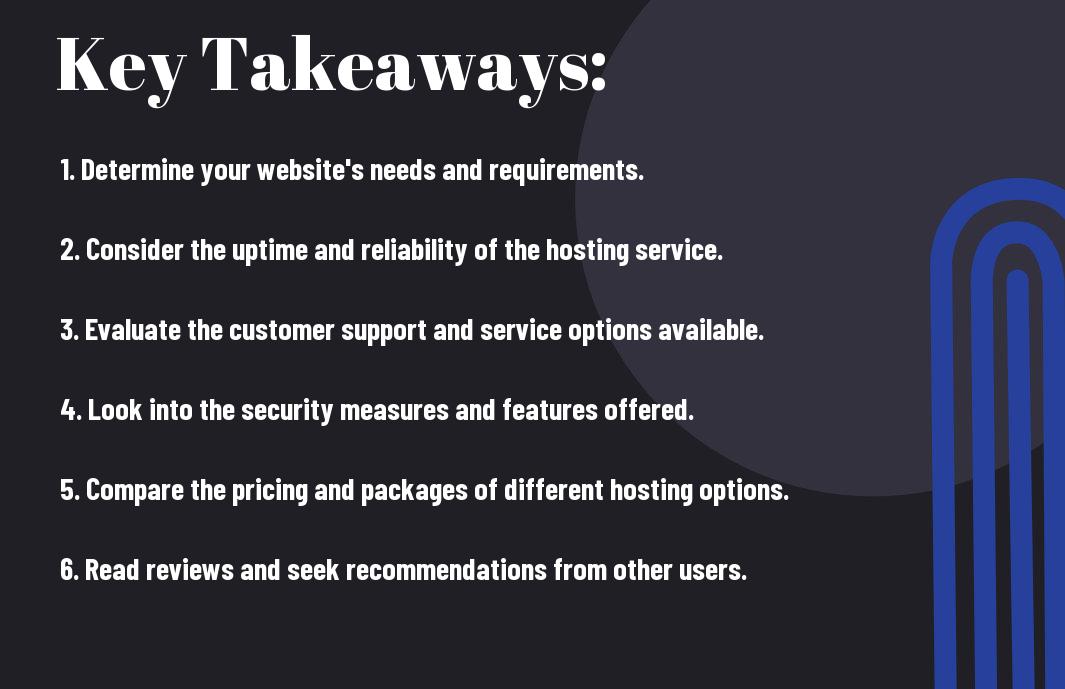Ensuring that you choose the right web hosting service for your website is crucial for your online success. With so many options available, it can be overwhelming to make the right decision. However, with the right information and guidance, you can confidently select the perfect web hosting service for your needs. In this blog post, we will provide you with essential tips and considerations to keep in mind when choosing the right web hosting service. From uptime reliability and customer support to server location and security features, we’ll cover everything you need to know to make an informed decision. By the end of this post, you will have the tools and knowledge needed to make the best choice for your website.
Key Takeaways:
- Consider your specific needs: Before choosing a web hosting service, identify what your website requires in terms of storage, bandwidth, security, and technical support.
- Research the reliability and uptime: Look for a web hosting service with a track record of high uptime and reliable performance to ensure your website is always accessible to users.
- Compare pricing and plans: Evaluate different web hosting options to find a balance between cost and features that align with your website’s needs and budget.
- Check customer support: Ensure that the web hosting service offers responsive and knowledgeable customer support to address any technical issues or concerns promptly.
- Review user feedback and testimonials: Read reviews and testimonials from current and previous clients to gauge the overall satisfaction and experiences with the web hosting service before making a decision.

Analyzing Your Hosting Needs
Some of the most important decisions you will make when choosing a web hosting service involve understanding your specific needs. Your website and business requirements will dictate the type of hosting service that will best serve you. To begin your analysis, take the time to understand your current and future needs by How to choose a web hosting service | Tom’s Guide.
Determining Your Website Type and Traffic
When determining your hosting needs, it is crucial to consider the type of website you have and the amount of traffic it receives. If you have a small personal blog with minimal traffic, you may be able to get by with shared hosting. On the other hand, if you have a large e-commerce site with high traffic volume, you may need a dedicated server or cloud hosting to ensure optimal performance. Knowing the type of website you have and its expected traffic will influence the level of resources and support you need from your hosting provider.
Scalability and Growth Considerations
Another important factor to consider when analyzing your hosting needs is the potential for growth. As your website grows and attracts more visitors, you will need a hosting solution that can scale and accommodate an increase in traffic and resource demands. It’s essential to choose a hosting service that offers the flexibility to upgrade your plan or seamlessly transition to a more robust hosting solution as your website expands. Failure to anticipate and plan for future growth can result in downtime, poor performance, and potentially lost revenue.
Types of Web Hosting Services
Despite the overwhelming number of options, when it comes to web hosting, you can generally choose from a few main categories. Here are the most common types of web hosting services:
| Shared Hosting | Multiple websites are hosted on a single server |
| Virtual Private Servers (VPS) | A physical server is divided into multiple virtual servers |
| Dedicated Hosting | You have an entire server to yourself |
| Cloud Hosting | Resources are spread across multiple servers, offering scalability and flexibility |
| Managed vs. Unmanaged Hosting | Providers handle server maintenance and technical support, or you are responsible for it |
Shared Hosting
If you are just starting out and have a limited budget, shared hosting can be a cost-effective option. It is easy to set up and manage, but keep in mind that resources are shared among multiple websites, so if one site experiences a surge in traffic, it can affect the performance of the others on the same server.
Virtual Private Servers (VPS)
With VPS hosting, you have more control and dedicated resources compared to shared hosting. It’s a good middle ground between shared hosting and dedicated hosting, offering more flexibility and scalability for your growing website.
Dedicated Hosting
If you have a high-traffic website or need complete control over the server environment, dedicated hosting gives you exclusive use of a physical server. This means you have full control over resource allocation and configurations, making it ideal for resource-intensive websites.
Cloud Hosting
Cloud hosting utilizes the resources of multiple servers, allowing for scalability and flexibility. It can handle traffic spikes better than traditional hosting types and offers a pay-as-you-go pricing structure, making it ideal for growing websites with fluctuating traffic.
Managed vs. Unmanaged Hosting
When opting for managed hosting, the provider takes care of server maintenance, security, and technical support. On the other hand, with unmanaged hosting, you are responsible for these tasks, which gives you more control but also requires technical expertise.
Key Features to Look For
Now that you understand the importance of choosing the right web hosting service, it’s time to focus on the key features that you should look for. Here are some essential features to consider:
- Uptime Guarantee: Look for a hosting provider that offers a minimum of 99.9% uptime guarantee to ensure that your website is always accessible to your visitors.
- Server Reliability: Reliable servers are crucial to ensure that your website runs smoothly without frequent downtime.
- Customer Support: 24/7 customer support is essential for resolving any technical issues or concerns that may arise quickly.
- Security Measures: Robust security measures, such as SSL certificates, firewalls, and regular backups, are vital to protect your website from cyber threats.
- Bandwidth and Storage: Sufficient bandwidth and storage capacities are crucial to accommodate your website’s traffic and data needs.
This list is not exhaustive, but considering these key features will help you make an informed decision when choosing the right web hosting service for your needs.
Uptime Guarantees and Server Reliability
When it comes to web hosting, uptime guarantees are crucial. You want a provider that offers a high percentage uptime guarantee, ensuring that your website is always available to your audience. Additionally, server reliability is equally important, as frequent downtime can negatively impact your website’s performance and reputation.
Customer Support and Service Quality
Having access to reliable customer support is crucial when choosing a web hosting service. You want to be able to reach out for assistance at any time and receive prompt and effective solutions to any issues that may arise. A hosting provider with excellent service quality can make a significant difference in your overall website management experience.
Security Measures and Backup Solutions
Security measures and backup solutions are non-negotiable when it comes to web hosting. A reputable provider should offer robust security features to protect your website from cyber threats, as well as regular backups to safeguard your data in case of unforeseen events.
Bandwidth and Storage Capacities
When selecting a web hosting service, it’s essential to evaluate the bandwidth and storage capacities offered. Your website’s performance and scalability depend on having adequate resources to accommodate your traffic and data requirements.

Making the Decision
For essential tips on choosing the right web hosting service, you can refer to our comprehensive guide on How To Choose a Web Hosting Provider.
Comparing Prices and Value
When comparing web hosting services, it’s important to consider both the cost and the value you’ll receive. This means examining the features and services included in each package. Look for a balance between price and offerings, and don’t be swayed by a low price if it means sacrificing essential features or reliability. You can use the table below to compare prices and value:
| Web Hosting Provider | Monthly Price |
| Provider A | $9.99 |
| Provider B | $12.99 |
Reading Reviews and Seeking Recommendations
Before making a decision, it’s crucial to read reviews and seek recommendations from other website owners. Look for patterns in the feedback and pay attention to any recurring issues or praise. Go beyond star ratings and delve into the specifics of what users liked and disliked. This can provide valuable insights into the reliability and performance of the web hosting service.
Testing the Service
One of the most important steps in choosing a web hosting service is to test it out yourself. Many providers offer a trial period or money-back guarantee, allowing you to experience their services firsthand. During this time, pay attention to the speed, uptime, and customer support. This hands-on experience will give you a clear picture of what it’s like to be a customer of the web hosting service, and help you make an informed decision.
Essential Tips for Choosing the Right Web Hosting Service
Now that you have learned about the essential tips for choosing the right web hosting service, you should feel confident in making a well-informed decision. Remember to consider your website’s needs, such as the amount of traffic, storage space, and uptime guarantees, as well as the reputation and customer support of the hosting provider. By carefully evaluating these factors, you can ensure that you select a web hosting service that will effectively support your website and help it grow effectively. Don’t rush into a decision, take your time to research and compare different options to find the best fit for your website’s specific requirements.
FAQ
Q: What are some essential tips for choosing the right web hosting service?
A: When choosing a web hosting service, consider factors such as uptime, support, security, scalability, and pricing. It’s important to assess your website’s needs and find a hosting provider that can accommodate them.
Q: What is uptime and why is it important in web hosting?
A: Uptime refers to the amount of time that a website is available and operational. It is crucial to choose a web hosting service with a high uptime percentage (ideally 99.9% or higher) to ensure that your website is consistently accessible to users.
Q: How important is customer support when selecting a web hosting service?
A: Customer support is a critical factor in choosing a web hosting provider. Look for a company that offers 24/7 customer support through various channels such as phone, live chat, and email. Responsive and knowledgeable support can make a significant difference in resolving any issues that may arise.
Q: What security features should I look for in a web hosting service?
A: When evaluating web hosting providers, prioritize those that offer robust security measures such as SSL certificates, regular backups, malware detection and removal, and DDoS protection. The security of your website and data should be a top priority.
Q: How important is scalability in a web hosting service?
A: Scalability is essential, especially if you anticipate your website’s traffic and resource needs to grow over time. Choose a web hosting service that allows for easy scalability, whether through the ability to upgrade to higher-tier plans or through flexible resources such as CPU, RAM, and storage.
